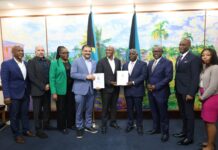“An unfair system produces unfair rules which are then enforced unfairly – this is not a system that should continue unchallenged.”

In a keynote address to a STEP LATAM conference held in Buenos Aires, Argentina, Attorney-General and Minister of Legal Affairs Ryan Pinder made a forceful case for how The Bahamas and other countries would benefit from changing how international tax rules are developed and enforced. STEP is a professional organization representing more than 21,000 attorneys, accountants, and trust and estate practitioners, across 95 jurisdictions.
For decades, the Organisation for Economic Co-operation and Development (OECD) has played the most significant role in shaping international tax rules and policies; Attorney-General Pinder argued that their policies and approach to enforcement have frequently favoured the wealthier, developed economies which comprise their membership. Noting that developing economies are not accorded a vote when consequential rules are adopted, AG Pinder called the process “flawed, inequitable, and unfair,” and said that the OECD has “consistently ignored the consequences of its agenda for non-members who are excluded from critical phases of policy design.”
The Attorney-General has worked on the issue with colleagues across the Global South, resulting in the successful passage of a United Nations Resolution (78/230) in December of last year, which recognizes that the United Nations can better support more inclusive and effective tax cooperation, and established a member-state led intergovernmental committee to draft terms of reference for an international tax convention. The Attorney-General, who has represented CARICOM and The Bahamas at the United Nations on this issue, believes that the self-interested and unfair enforcement of OECD rules, in particular as they relate to blacklisting, have harmed growth and progress in countries like The Bahamas. He called for revitalizing multilateralism in tax policy, saying countries like The Bahamas must be “represented, resourced, and empowered.”
Noting that the strong support among fellow member states for the creation of a new international tax framework under UN auspices, with 110 countries voting in favour of the December 2023 resolution, AG Pinder said it was important that global tax policies reflect the unique needs of small island states like The Bahamas. Referring to the work ahead to establish a new, more inclusive paradigm, the Attorney-General noted that The Bahamas intends to continue being active in further negotiations, to ensure our national interest is reflected in the global tax architecture.
“We are moving towards a new era,” he said, “in which tax cooperation and the enforcement of tax rules will be more even-handed, more just, more inclusive, and more effective.”







